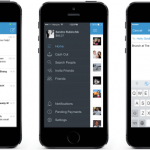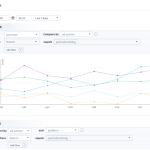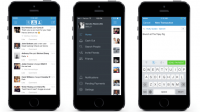Cloakroom 2.0 Is Like “Whisper For Capitol Hill”—And It’s Not Half As Bad As You Think
Last year, former congressional staffer Ted Henderson released an anonymous chat app for Washington, D.C. staffers and insiders to freely discuss bills and issues—think Whisper but for Capitol Hill. After building a solid user base, Henderson released Cloakroom 2.0 last week with polling and social tools, which may turn what was once “just another anonymous messaging app” into a truly valuable knowledge base of insider politics.
The social side of Cloakroom is, again, sort of like the controversial app Whisper—or the even more controversial (and now defunct) Secret—only for Beltway regulars. To log in, users must either register and be vetted via email or be physically present within the boundaries of Washington, D.C. That keeps the user base within the industry, establishing trust—a tricky thing to build in an app that gives users one to five aliases allowing them to be as anonymous as they want.
The new features aim to open up dialogue about bills being discussed on the floor of Congress. Users can ask each other how they would vote on congressional bills, producing a tally among insiders who probably write far more of the laws in this country than the congresspeople we elect. Henderson included a gamification aspect by adding a leaderboard that shows who has “whipped” the most votes from other users—and thus increased participation.
“We hope to generate crowdsourced data from insiders on Congress,” says Henderson. “If Capitol Hill insiders are 500 for this bill and 100 against, what are the contextual insights? What were those arguments that users made to whip those positions on bills? Why is Cap Hill so far for this bill or against that one? In crowdsourcing some data, maybe this is something to use to more efficiently legislate an ideal world.”
More than a data spigot, Henderson wants Cloakroom to be a space where staffers can meet between the aisles and have real productive discussions. To that end, Cloakroom hosts a Q&A series with prominent thought leaders. The presentations are text-only without visual media, but that makes Cloakroom’s low-key anonymity perfect for insiders who want to attend a speech but are unable to be there in person. These aren’t just political speakers either: To celebrate the launch of Cloakroom 2.0, Henderson brought Bill Nye (you know, The Science Guy) to speak about climate change.
Henderson’s first foray into the political tech niche was an app called “Capitol Bells”, which began as a congressional vote alarm and grew into a website for constituents to keep tabs on how their representatives vote. The website had potential, but users were confused by the barrage of features such as social polling (users asking each other how they’d vote on bills and measures) and representative voting history.
“Not only was [Capitol Bells] too complicated,” admits Henderson, “but who am I talking to? I don’t know these people, and there was no community here; no substrate to build that interconnectivity off of.” He tried to avoid this with Cloakroom by releasing it as a social app first and waiting until a community developed before introducing more functionalities.
But building an anonymous community meant anonymous commentary, which can quickly get sour. Leaked conversation screenshots unleashed a flurry of bad press for Cloakroom last fall, painting Cloakroom 1.0 as a clubhouse of misogynistic horndogs and representing the ugliest facets of anonymous messaging. Not only were those conversations not representative of the whole, Henderson claims, they were immediately flagged by Cloakroom’s community and Henderson’s team took them down. The community is pretty self-policing, he said, pointing to a communally agreed upon ban on terms like “Skintern,” which is derogatory Capitol Hill lingo for attractive, inappropriately dressed interns.
“I can count on one hand the number of harassment incidents we’ve had in Cloakroom,” says Henderson. “If you’re not harassing someone, accusing someone, being sexually graphic, saying disgusting things, not gossiping about your coworkers in a way that would identify them and potentially threaten your career, we’re going to let you guys figure out your limits.”
Henderson and his team are extremely judicious in what they choose to censor. The app’s anonymity provides a space for honesty and disclosure—a rarity in politics where every comment is scrutinized and viewed as a reflection on a staffer’s superiors.
“The Daily Mail wrote about a male staffer saying [on Cloakroom] that they’d been sexually harassed by his female chief of staff,” says Henderson. “We got some bad press for that, but our side was that he actually had a chance to air this and talk about it and get support from others….Whereas in the closed community of the Hill? He couldn’t do that.”
Fast Company , Read Full Story
(41)














